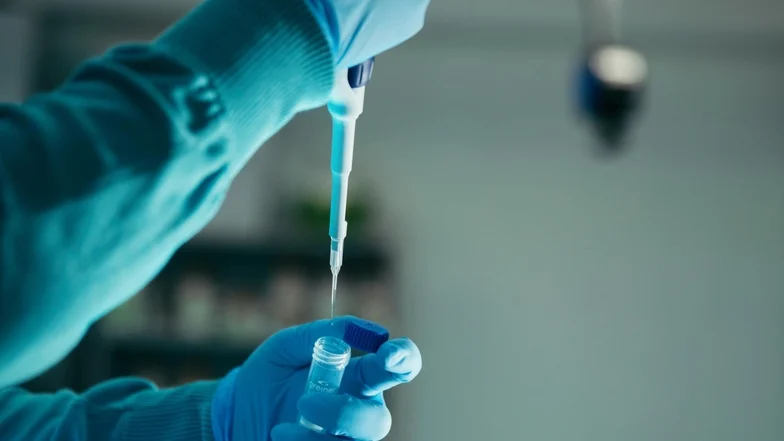Von Björn Hartmann
Für viele ist Corona längst Geschichte. Andere Probleme drängen. Doch einige Wirtschaftsexperten arbeiten daran, dass die Welt künftig besser vorbereitet ist auf solche Pandemien und sie schon zu Beginn stoppen kann. Wichtig sind Medikamente gegen Viren, doch Pharmafirmen weltweit wollen sie nicht entwickeln. Zu unklar ist, ob sich je Geld damit verdienen lässt. Ein Konzept aus Deutschland, das gerade in den USA ausgezeichnet wurde, soll dieses Problem jetzt günstig lösen. Schließlich kostete Corona die Welt Billionen Dollar.
Die Pandemie startete Ende 2019 im chinesischen Wuhan und breitete sich dann immer schneller weltweit aus. Viele Länder reagierten mit Ausgangssperren, schränkten Reisen ein. Maskenpflicht galt. Dem deutschen Pharmaunternehmen Biontech aus Mainz gelang es, einen Impfstoff zu entwickeln. Auch Moderna aus den USA und Astrazeneca aus Großbritannien zogen nach. Doch da hatte sich das Virus schon über den Globus ausgebreitet, war mutiert und hatte großen Schaden angerichtet. Weltweit starben im Zuge von Corona geschätzt rund 27 Millionen Menschen, die Weltwirtschaft stockte.
Warum nicht investiert wird
Zeit ist ein wichtiger Faktor: „Liegen Medikamente früh nach einem Ausbruch vor, sind insgesamt deutlich weniger davon nötig als zum Höhepunkt einer Pandemie“, sagt Jano Costard von der Bundesagentur für Sprunginnovationen (Sprind) in Leipzig, die innovative Konzepte und Produkte entdecken und fördern soll. „So kann vielleicht verhindert werden, dass aus einem Ausbruch überhaupt eine Pandemie wird.“ Im Ernstfall ein Medikament kurzfristig zu entwickeln, dauere sehr lang, habe einen ungewissen Ausgang, sei sehr teuer und koste viele Menschenleben.
Die Experten von Sprind errechneten gemeinsam mit Ökonomen der University of Chicago und der Harvard Kennedy School, dass die Zahl der erkrankten und gestorbenen um 99 Prozent niedriger gewesen wäre, hätte es entsprechende Medikamente bereits zu Beginn der Pandemie gegeben. Und es wären Verluste von 28 Billionen Dollar weltweit vermieden worden. Das entspricht etwa dem Bruttoinlandsprodukt der USA. Eingerechnet sind Todesfälle, wirtschaftliche Schäden und langfristige Schäden durch Schulschließungen.
Das Problem sind nicht so sehr die Medikamente selbst, die ein breites Spektrum von Viren ausschalten können, für weitere schnell anpassbar sind und verhindern, dass sie übertragen werden. „Entsprechende Medikamente zu entwickeln, ist eine Herausforderung, aber es ist möglich“, sagt Sprind-Experte Costard. Die Schwierigkeit liegt woanders: „Pandemien sind auch deshalb eine Herausforderung, weil wir nicht wissen, wann sie auftreten. Deshalb ist für die Pharmaindustrie unklar, wann es eine Nachfrage für Pandemie-Medikamente gibt und ob sie damit überhaupt einen Erlös erzielen. Deshalb wird nicht investiert.“ Der Markt versagt. Es gibt Bedarf, aber niemand kümmert sich um ein Angebot, weil es zu unsicher wäre. Die Idee, um das Problem zu lösen: konkrete, belastbare Nachfrage erfinden. Eine Staatengemeinschaft formuliert, welche Anforderungen die Medikamente erfüllen sollen. Und: „Die öffentliche Hand garantiert, die Medikamente abzunehmen“, sagt Costard, der das Konzept mitentwickelt hat – eine Art Vorkaufsrecht der Staaten.
Der Clou: „Sind die Voraussetzungen erfüllt, kaufen die Länder, unabhängig davon, ob sie das Medikament in diesem Moment schon brauchen.“ Im Zweifel verfalle es. „Aber es ist wirtschaftlich sinnvoller, eines wegzuwerfen, als keines zu haben.“ Für die Staaten hat das Modell noch einen anderen Vorteil. Weil die Unternehmen das Medikament entwickeln, tragen sie und ihre Investoren auch das finanzielle Risiko, sollten sie scheitern. „Denn der Staat zahlt nur für erfolgreiche Medikamentenentwicklung“, sagt Costard.
Leipziger Agentur für Sprunginnovationen gewinnt 290.000 US-Dollar
Mit dem Konzept hat Sprind jetzt einen internationalen Innovationswettbewerb der Universität von Chicago gewonnen. Zum Start 2023 gingen beim Market Shaping Accelerator (MSA) des Nobelpreisträgers Michael Kremer 190 Konzepte ein. Kremer und sein Team beschäftigen sich intensiv mit Fällen, in denen der Markt versagt und deshalb nicht investiert wird. Das MSA hat auch am Sprind-Konzept mitgeholfen. Es gab nicht nur 290.000 Dollar Preisgeld, das Siegerkonzept soll auch umgesetzt werden – mit umfassender internationaler Unterstützung.
Denn ein Land allein wird das nötige Geld nicht aufbringen können. „Eine große Koalition ist nötig, damit solche Medikamente entwickelt werden“, sagt Costard. „Es besteht die Gefahr, dass einzelne Länder die anderen machen lassen und, wenn alles finanziert ist, als Trittbrettfahrer aufspringen. Weil das alle vorher wissen, kann eine Koalition scheitern – doch dann hat am Ende niemand ein Medikament.“
Sprind fördert derzeit selbst vier Unternehmen, die Medikamente gegen Viren entwickeln. Darunter ist eine Firma, die Viren im Körper mit einer Art Kescher aus DNA-Origami einfangen will. Ein Team arbeitet daran, Viren per Genschere unschädlich zu machen. Ein weiteres plant ein Medikament, das Viren nach dem Einatmen auf der menschlichen Nasen-Schleimhaut festhält. Sie werden dann mit dem Schleim heruntergeschluckt und im Magen unschädlich gemacht. Die Firmen wollen jetzt nachweisen, dass ihr Ansatz im Tierversuch funktioniert. Danach wird es richtig teuer. Und es dauert. Von der Idee bis zum fertigen Medikament sind im Schnitt zehn Jahre nötig. Findet sich also jetzt kein Investor, war es das mit den Medikamenten.








